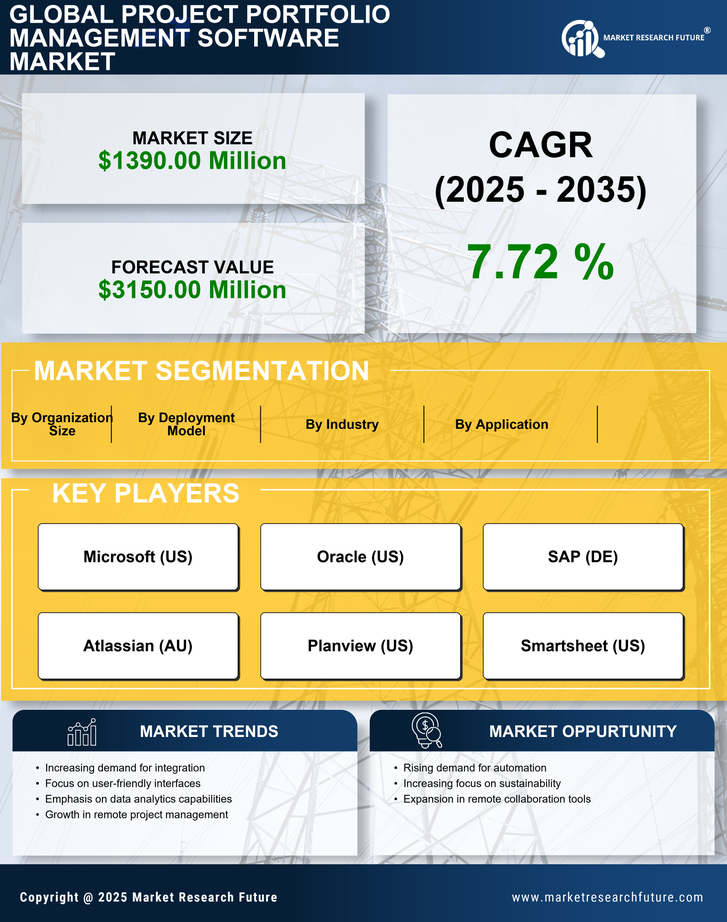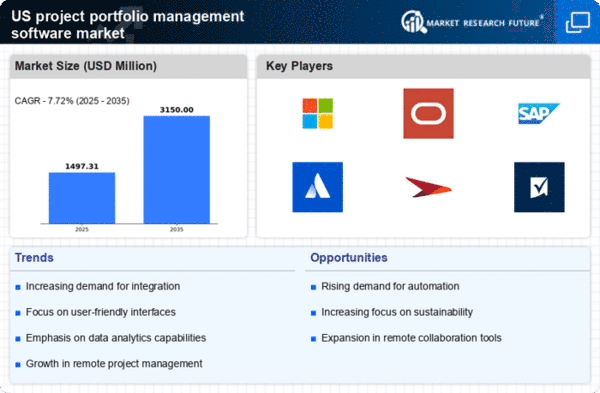Rise of Agile Methodologies
The adoption of agile methodologies is reshaping the project portfolio-management-software market, as organizations seek to enhance flexibility and responsiveness in project execution. Agile practices emphasize iterative development and continuous feedback, which necessitate robust software solutions to manage multiple projects simultaneously. In the US, approximately 70% of organizations have reported implementing agile practices, leading to a surge in demand for software that supports these methodologies. This shift not only improves project delivery times but also enhances stakeholder engagement, thereby increasing the overall effectiveness of project management. Consequently, the project portfolio-management-software market is likely to see sustained growth as more companies transition to agile frameworks.
Emergence of Cloud-Based Solutions
The emergence of cloud-based solutions is transforming the project portfolio-management-software market, offering organizations enhanced accessibility and scalability. Cloud technology enables teams to collaborate in real-time, regardless of geographical location, which is increasingly important in today's remote work environment. Data suggests that the adoption of cloud-based project management tools has grown by over 40% in the past few years, as companies seek to leverage the benefits of cloud computing. This shift not only reduces IT overhead costs but also allows for seamless updates and integration with other business systems. As more organizations migrate to cloud platforms, the project portfolio-management-software market is poised for significant expansion.
Increased Focus on Risk Management
In an era marked by uncertainty, the project portfolio-management-software market is witnessing an increased focus on risk management. Organizations are prioritizing the identification and mitigation of risks associated with project execution, which has led to a demand for software that offers advanced risk assessment features. Recent studies indicate that companies utilizing project portfolio-management software with integrated risk management capabilities can reduce project failure rates by up to 25%. This trend is particularly relevant in sectors such as finance and healthcare, where regulatory compliance and risk mitigation are paramount. As businesses continue to navigate complex project landscapes, the emphasis on risk management is expected to drive further growth in the project portfolio-management-software market.
Growing Need for Resource Optimization
The project portfolio-management-software market is experiencing a growing need for resource optimization as organizations strive to maximize efficiency and minimize waste. Companies are increasingly recognizing that effective resource allocation can lead to significant cost savings and improved project outcomes. According to recent data, organizations that utilize project portfolio-management software can achieve up to 30% reduction in resource-related costs. This trend is particularly pronounced in industries such as IT and construction, where project complexity necessitates sophisticated management tools. As businesses continue to face competitive pressures, the demand for software solutions that facilitate better resource management is likely to increase, driving growth in the project portfolio-management-software market.
Demand for Enhanced Reporting and Analytics
The project portfolio-management-software market is experiencing a heightened demand for enhanced reporting and analytics capabilities. Organizations are increasingly recognizing the value of data-driven insights in making informed project decisions. Advanced analytics tools enable project managers to track performance metrics, assess project viability, and forecast future outcomes with greater accuracy. Recent findings indicate that companies utilizing sophisticated reporting features can improve project success rates by as much as 20%. This trend is particularly relevant in industries such as marketing and product development, where data plays a crucial role in strategy formulation. As the need for actionable insights continues to grow, the project portfolio-management-software market is likely to expand in response.

















